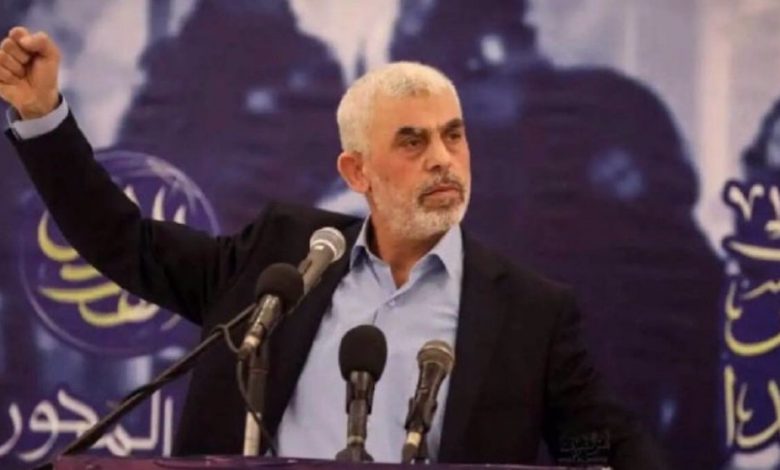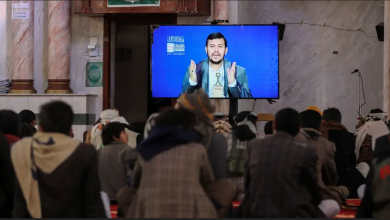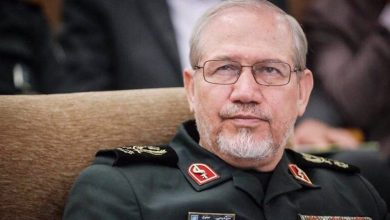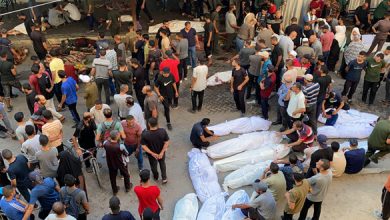Yahya Sinwar hailed as a courageous leader by internet users in heartfelt tributes as he falls in battle
Social media platforms witnessed a wave of reactions following reports on the death of Hamas leader Yahya Sinwar.

On Thursday, the body of Sinwar was discovered in the city of Rafah in southern Gaza. He was found wearing a combat vest, and an AK-47 rifle was located beside him.
The influential figurehead of the Palestinian resistance movement has evaded numerous assassination attempts, both preceding and following the incidents of October 7.
Over the past year, 62-year-old Sinwar has been a pivotal figure in orchestrating and overseeing Operation Al-Aqsa Flood in Gaza, according to sources familiar with the matter.
Yahya Sinwar, who ascended to the leadership of Hamas in Gaza in 2017, previously endured a 22-year incarceration in an Israeli prison. His release occurred in 2011 following a prisoner exchange agreement.
British journalist and award recipient Afshin Rattansi has reported that, contrary to the narrative perpetuated by media outlets in the United States, United Kingdom, and European Union over the past year, Hamas leader Yahya Sinwar has not met his demise in a tunnel, as some sources have suggested. Reports incorrectly claimed he was encircled by Israeli hostages and wearing a suicide belt.
“He was reportedly killed at the frontline, adorned with a Palestinian keffiyeh and equipped with a tactical vest and AK-47, as he directly confronted Israeli military personnel. His efforts mirrored those of the broader Palestinian resistance in Gaza over the past year,” he stated.
Journalist and filmmaker Dan Cohen described Yahya Sinwar as a courageous leader who stood in opposition to the Israeli occupation and played a pivotal role in preparing the Palestinian resistance for future liberation. Cohen highlighted Sinwar’s leadership qualities as starkly contrasting to those of the Israeli officials currently celebrating.
Palestinian social media activist Nerdeen Kiswani recently shared a tweet quoting Yahya Sinwar from his novel, “The Thorn and the Carnation,” stating that living for a single moment with dignity and pride outweighs a millennium spent in misery under oppressive occupation.
Nour Zeidan has reported via Twitter that Yahya Sinwar was located above ground level, contrary to earlier assumptions that he might be concealed within a tunnel or surrounded by civilians. Instead, Sinwar was reportedly situated alongside his fighters on the front line.
“Our fallen heroes are a source of pride and strength, not weakness or shame,” he stated. “Our struggle for liberation and resistance endures. May they rest in peace.”
In a recent tweet, Omar from Gaza expressed a staunch stance on resistance, stating, “We will all follow the path of resistance and the path of Sinwar. Should Sinwar be killed today, a hundred others will rise in his place.”
A spokesperson stated that the assassination of Yahya Sinwar would not deter Palestinians from protecting their land, asserting that Israel is mistaken if it believes otherwise. The statement highlighted that Israel has historically targeted numerous leaders, such as Yasser Arafat, Ahmed Yassin, Abdul Aziz al-Rantisi, Abu Ali Mustafa, and Ismail Haniyeh, among others.
He noted that, contrary to expectations, the result has consistently been the opposite, with resistance intensifying, becoming more formidable and resolute.
In a recent tribute, journalist Mr. Haque characterized Yahya Sinwar as a valiant and steadfast figure who, at the age of 62, devoted his life to defending his people, land, and Al-Quds against formidable adversaries. Haque’s remarks reflect on Sinwar’s longstanding commitment and his legacy as a celebrated figure in the Palestinian struggle.
A statement attributed to the Red Collective described the late Hamas leader, Yahya Sinwar, noting that his family was forcibly expelled from Gaza during the 1948 conflict, reportedly by Israeli forces. Throughout his life, Sinwar is said to have witnessed numerous acts of violence, including the deaths of friends and family, attributed to Israeli military actions. The statement suggested that, despite his death, such incidents have reportedly inspired countless others to join the fight for Palestinian liberation.
In a strategic move intended to deliver a significant message to the residents of Gaza, Yahya al-Sinwar was deliberately chosen as the leader of Hamas, even with the awareness of the heightened risk of fatal conflict. This was reported by journalist Elijah J. Magnier.
He stated that his choice to stay actively involved in the conflict underscored his commitment to face the same dangers and hardships as the civilians and fighters in Gaza. This act, he said, emphasized that the leaders of Hamas would not desert their people during times of crisis.
The death of Sinwar, although a notable blow to Hamas leadership, carries substantial symbolic significance. It sends a clear message to the residents of Gaza that their leaders are equally dedicated and ready to make the ultimate sacrifice. Sinwar’s decision to die in combat likely aimed to underscore that the resilience of Hamas, as a movement, is not reliant on individual leaders. Instead, the ideology and the cause of resistance continue to persist through the populace, he stated.
Sinwar’s demise may be seen as a symbolic triumph against Israel, underscoring his alignment with the Gazan population and dedication to their cause. This narrative—that the leadership of Hamas shares in the adversities faced in the conflict—fortifies the group’s ties with the people of Gaza, ensuring the resilience of the movement in the face of leadership losses, he concluded.
Palestinian surgeon known as Doc Jazz recently asserted in a statement that “The Resistance endures as it is a righteous cause, not attributable to a single individual. Nevertheless, he was a figure whose presence cast others in a shadow of juvenile comparison, and he perished in combat, rather than in concealment.”
Following the assassination of Ismail Haniyeh, Yahya Sinwar has been appointed as the new overall leader of Hamas.
Haniyeh was assassinated in a targeted operation in late July while in Tehran, the capital of Iran, where he had traveled to participate in the inauguration ceremony of the Islamic Republic’s newly appointed President, Masoud Pezeshkian.




